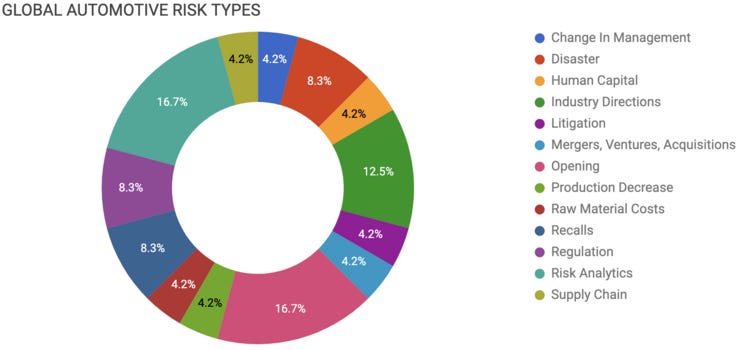Elm Analytics - Automotive Supply Chain Risk Digest #275 - May 13 - 19, 2022
CHANGE IN MANAGEMENT
Stellantis named Martin Horneck as its new supply chain and purchasing head last week. In the process, the company dropped many of the hot-button terms and conditions imposed on suppliers in January. The previous agreement forced suppliers to share any cost savings and could lock them into unfavorable contracts.
DISASTER
A workplace accident at Michelin's Nova Scotia tire plant has left one person dead.
OSHA proposed fines of $342k in response to three non-fatal incidents at Continental Tire's Mount Vernon, Illinois plant in November 2021. In two separate incidents, one worker suffered amputated fingers, another with severe burns, and the third with a concussion.
HUMAN CAPITAL
GM, Ford, and Stellantis reinstated mask mandates at Michigan plants located in counties with high COVID levels per the CDC.
INDUSTRY DIRECTIONS
Automotive News: How can auto suppliers manage the next great disruption?
Mercedes is teaming with battery material company Sila to utilize their new high-silicon anode material in EV batteries. Sila's technology will increase battery energy density by 20-40%.
Valeo says it will unveil new lidar technology in 2024, providing a twelvefold increase in resolution, a tripling of range, and a much wider viewing angle. They say the tech will enable Level 4 autonomous driving in vehicles.
LITIGATION
Rivian and Commercial Vehicle Group are working to resolve a dispute and pending litigation over seating components in its EV delivery vans.
MERGERS, VENTURES, ACQUISITIONS
Renault will sell its majority stake in Russian automaker Avtovaz to a state-run research institute known as NAMI. They are also selling their other operations in Moscow to the city government.
OPENING
Nissan is considering a third US EV assembly plant by 2030.
South Korean aluminum part supplier Shinhwa will build a new parts plant in Auburn, Alabama, across the street from its existing plant. The $78M plant will create 42 jobs over the next three years.
Hyundai / Kia is planning a new $16.5B EV factory in South Korea. The facility will produce 150k EVs / month by 2030.
Lucid will build an EV plant in Saudi Arabia with $3.4B in incentives and financing.
PRODUCTION DECREASE
This week, Audi's Neckarsulm, Germany plant cut production of its A4, A5, and A8 models. Chip shortages, the war in Ukraine, and COVID-19 lockdowns in China are causing supply issues.
RAW MATERIALS
NYT: What's down the Road for Silicon?
RECALLS
Mercedes is recalling over 290k vehicles in the US due to a braking defect that could cause a failure. The recall covers some ML-Class, GL-Class, and R-Class vehicles from 2006-2012.
REGULATION
China is reportedly in talks with automakers to extend incentives for EVs set to expire this year. The expensive subsidies, which began in 2009, have been credited with creating the world's largest EV market.
NHTSA is opening a probe into a fatal Tesla crash in California that claimed three lives earlier this month. Reports suggest that the Model S' advanced driver assistance system may have been used.
RISK ANALYTICS
When Russia held back natural gas deliveries to Germany last week, manufacturers took steps toward enacting a crisis plan. Worst-case scenarios have BMW, Mercedes-Benz, and VW burning propane or butane to support steam and heat for paint shops and shuttering foundries.
A UK-based security firm NCC Group researcher has demonstrated that it is possible to hack Tesla's keyless entry system to unlock, start, and drive a vehicle. They added that the hack is not specific to Tesla.
Sam Fiorani, AutoForecast Solutions:
"The supply of automotive-grade semiconductors continues to hamper global output of trucks and passenger cars, even if the short-term losses do not seem to reflect this slowdown."
A new whitepaper from ABI Research suggests that despite OEMs investing an estimated $515B into EV technology over the next 5-10 years, automakers have not adequately recognized other impacts the EV transition will have on supply chains.
SUPPLY CHAIN
A report from Cass Information Systems points to freight volumes slowing due to inflation, rising interest rates, and higher fuel prices.








